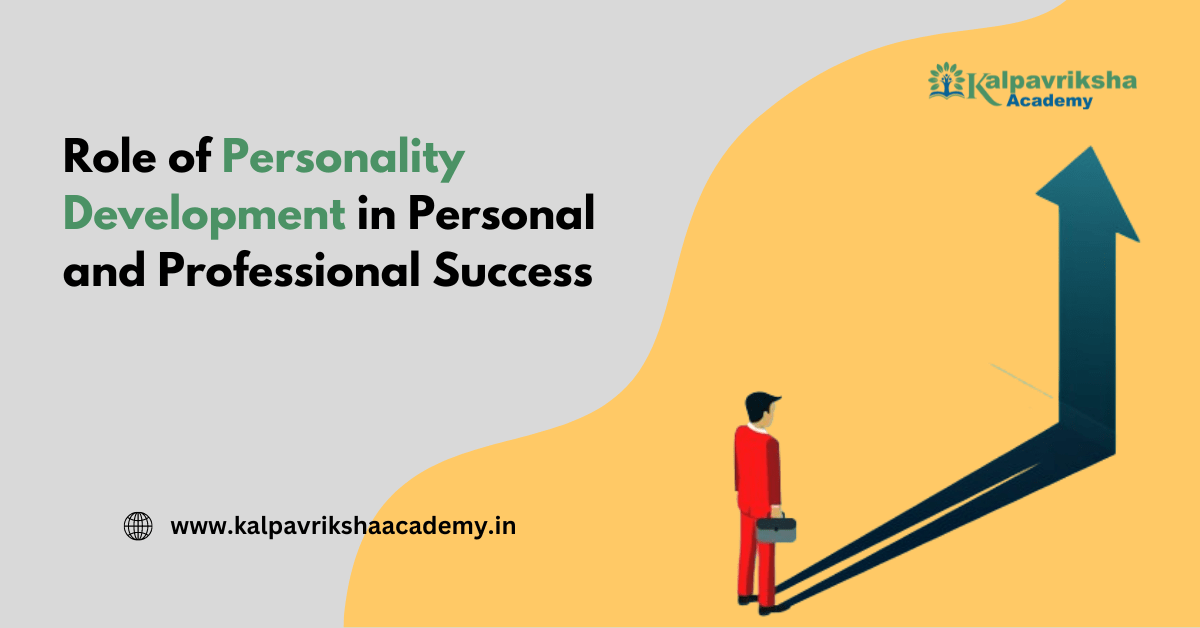Role of Personality Development in Personal and Professional Success
Personality growth is a dynamic, lifelong journey directed towards enriching personal characteristics, actions, and ways of thinking in order to boost life progress. It involves factors like how well people recognize themselves as well as their feelings toward others.
It enhances developing emotional intelligence, communication skills, self-awareness, resilience and other aspects. People are capable of improving their connection with other people on an individual level and being able to solve their problems in their personal as well as in professional life by participating in personality development programs.
We will explore the key elements of personality development and provide practical tips to help you unlock your full potential and lead a more fulfilling life.
Importance of personality development in career advancement
The importance of personality development in career advancement is the following:
Improved Communication Skills: Effective communication is important in any professional field. Developing your personality can help you present your ideas clearly, listen actively, and engage in meaningful conversations.
Confidence and Self-Esteem: A well-developed personality boosts your confidence and self-esteem, enabling you to take on new challenges, present yourself assertively, and handle criticism constructively.
Leadership Qualities: In order for personality growth to occur, one must typically consider such facets of leadership as decision-making ability, problem-solving expertise, inspiration of other people as well as the ability to provoke drive among them. All these factors are essential for professional promotion.
Professionalism and Work Ethic: A developed personality portrays professionalism, strong work ethic and optimistic thinking traits that employers and colleagues value highly towards the profession .
How do strong communication skills enhance personality development?
Strong communication skills are fundamental to personality development, as they enable individuals to express themselves clearly, build meaningful relationships, and increase social interactions effectively. Enhance your communication skills for personality development with the following significant ways:
Improved Self-Expression: One can effectively express their own thoughts, ideas and emotions if they have good communication skills. Confidence and aggression result in a strong character.
Active Listening: Good communication is not only speaking well, but it means listening. Listening enables one to get another person’s point of view, therefore, enables one to be empathetic and to understand other people much better. In addition, it also plays a big role in that person’s emotional growth as well as the kind of relationship that makes them relate well with others.
Body Language and Non-Verbal Cues: Good communication entails grasping and employing body movements besides other absent verbal signs. If one takes control of these, they can compete in a stronger personality which will add some weight to their interesting personality aspect.
Confidence Building: The more adept you get at talking to people, the more your confidence readjusts itself appropriately because it is signifying when not talking matters in addition
Networking Abilities: For linking people up and sharing ideas, effective communication in networking is essential. As networking promotes the personal or professional development of individuals.
Personality development tips for both personal and professional growth
Here are some valuable tips for personality development that can benefit both personal and professional growth:
Personal Growth Tips
Self-Awareness:
- Think deeply about the good things, areas of improvements in one self, or particular limitations and vulnerability in oneself
- Regularly seek feedback from others to gain new perspectives.
Positive Attitude:
- By concentrating on solutions rather than problems, foster an optimistic mindset.
- Keep a positive mindset by expressing gratitude for stuff and keeping calm nature.
Continuous Learning:
- If you want to keep learning as you grow old, read books, take classes, try new things.
- Keep yourself interested and receptive to other points of view or fresh ideas.
Emotional Intelligence:
- Develop self-regulation to manage your emotions effectively.
- Practice empathy by understanding and valuing others’ feelings.
Health and Wellness:
- In order to lead a healthy life, make sure you get enough sleep, consume proteins and work out more often.
- You could use meditation or yoga to tackle stress.
Time Management:
- Focus on getting things done on time and setting achievable targets.
- Ensure that you use calendars and to-do lists for better organization.
Professional Growth Tips
Effective Communication:
- Make steps in how you speak to others using your mouth or writing and improve your behavior.
- In the presentation of ideas use thinking that is clear and be attentive when listening to others.
Networking:
- Use such conditions when creating or sustaining networking in order to cultivate business relationships.
- It is important to seek professional advisory services or mentorship from an established practitioner if engaged in professional activities.
Leadership Skills:
- Sign up for the leadership role or other projects you now engross in more.
- It is important for you to be able to problem solve and make choices as well.
Professionalism:
- Show reliability, timeliness, and ethical conduct.
- Dress properly and keep up a formal look.
Skill Development:
- Always update your skills in the most current technologies and industry trends.
- Do professional certifications and training programs that fit your profession.
6 key factors influencing personality development
Personality development is influenced by a variety of factors that shape an individual’s character, behavior, and overall personality. Here are some key factors:
Genetic Factors:
- Personality is highly dependent on genetic factors such as temperament or natural orientation which are passed down through generations from our parents.
- Personality development can be influenced by genetic factors such as intelligence, emotional stability and creativity.
Environmental Factors:
- The way your parents raised you, how your family works and memories from your childhood days affect the type of person you are.
- Good environments where one is cared for result in stable development of one’s character; however, bad ones can make adolescents face difficulties.
Education and Socialization:
- By this, it is meant that formal education aids in personality development because it imparts knowledge hence enabling one to think critically and interact socially.
- Groups in school and mobilities in society at large plays a significant role in socializing the young people thereby ensuring they are well equipped with social life such as relationships among others
Psychological Factors:
- The process of living, which encompasses our victories and defeats together with the most remarkable happenings, determines an individual’s sense of self as well as his or her skills at dealing with stress.
- It also contributes to increased self-assurance, while failures can necessitate special ways of behavior change.
Biological Factors
- The configuration of the brain and its neurochemical activities can make one be more impulsive, aggressive, or social.
- It also shows that hormonal aspects during adolescence years influence growth of one’s character.
Emotional Intelligence:
- Emotions control ourselves whenever we are not aware what kind of feeling is driving us at the moment.
- They are responsible for dominating other bodily functions irrespectively of our own wishes about them.
Effective strategies for personality development in students
Personality development in students is crucial for their personal and academic success. Here are some effective strategies to help students develop a well-rounded personality:
Encourage Self-Awareness:
Activities that demand students to keep journals or participate in seasonal self-reflection exercises to figure out their areas of strength, where they fall short, matters close to their hearts, and future ambitions should be promoted. This is the information that should be given back constructively alongside advising learners to ask for it from their fellow learners and instructors; it influences how they behave as well as what they achieve in school.
Develop Communication Skills:
One way of fostering public speaking is through presentation, debate or group discussion. Enhance communication skills through training on active listening techniques which could enable you to make appropriate responses based on what others are saying.
Promote Critical Thinking and Problem-Solving:
The use of actual situations and previous events which require problem solving and critical thinking for their development is what makes up case studies and scenarios. In scenarios or real situations, people can develop their problem-solving skills and critical thinking if given appropriate examples.
Build Confidence and Self-Esteem:
Recognize and celebrate the achievements and efforts of the students for positive reinforcement and to build their confidence.Challenge their tempo zones of comfort would entail stepping out of comfort zones of the students through undertaking new challenges as well as responsibilities.
Develop Leadership Skills:
Roles in leadership are offered to students so that they get involved in school projects, clubs or community activities.\n Encourage collaborative projects such as teamwork practice where they become leaders on different projects as part of a group.
Support Physical and Mental Well-being:
Encourage individuals to embrace a healthy lifestyle such as physical fitness, balanced nutrition as well as sleep for sustainable wellbeing. Provide assistance in the retrieval of psychological services or information for stress or emotional problems.
Encourage Social and Cultural Awareness:
In the classroom, we need to ensure that there is diversity by finding possible ways through which we can enable young learners to appreciate other people’s cultures and viewpoints. One way could be involving the learners in serving projects while another one could involve engaging them with any type of charity work within their societies for example cleaning up exercises or fundraising programs.
What are the best techniques for personality development?
Effective personality development involves a combination of self-awareness, skill enhancement, and behavioral adjustments. Here are some of the most effective techniques for personality development:
Self-Reflection and Awareness
Journaling: One should write notes regularly. In those notes you should include your thoughts, experiences, and reflections. This will enable you to trace changes in your emotions as well as behavior patterns.
Goal Setting
SMART goals refer to Specific, Measurable, Achievable, Relevant and Time-bound targets that offer guidance and incentive. Goal achievement is enhanced by splitting them into smaller components while assigning a date for each task.
Continuous Learning
Reading: Gain insights and inspiration, read books on psychology, personal development and successful people. Courses and Workshops: Acquire new skills and knowledge by participating in workshops, online courses and seminars.
Communication Skills
Public Speaking: Practice public speaking through clubs or by participating in debates and presentations.
Active Listening: Focus on truly understanding what others are saying without interrupting, and ask clarifying questions.
Time Management
Prioritization: Prioritize time management and monitor your schedule
Scheduling: Plan your day with a schedule or a to-do list to manage your time efficiently.
Social Skills
Networking: Attend social events, join clubs, and participate in group activities to build and enhance your network.
Body Language: Improve non-verbal communication by working on body language, eye contact, and facial expressions.
Leadership and Teamwork
In order to gain leadership experience, one must assume leadership responsibilities in group activities, community projects and organizations or societies. The most suitable way of acquiring better communication, cooperation with teammates as well as abilities in conflict management is through such projects as joint tasks.
Confidence Building
Use positive affirmations to boost self-confidence and self-esteem. Carry out each target little by little so as to be able to gain self esteem and increase your self-confidence.
Healthy Lifestyle
Engage in regular physical exercise to improve physical health and wellbeing. Maintain a balanced diet and get sufficient sleep to promote overall wellness.
Ethical and Moral Development Value Clarification:
Let your actions be the reflection of your innermost values and beliefs.
Integrity: In every area of your life, be honest, fair and morally upright.
What topics are covered in a personality development course syllabus?
A personality development course syllabus typically covers a wide range of topics aimed at enhancing various aspects of an individual’s personality, including self-awareness, communication skills, emotional intelligence, and professional skills. Here are some common topics that might be included:
Introduction to Personality Development
- Definition and importance of personality development
- Understanding different personality types
- Self-assessment and goal setting
Self-Awareness and Self-Improvement
- Techniques for self-reflection and self-awareness
- Identifying strengths and weaknesses
- Setting personal and professional goals
Communication Skills
- Verbal and non-verbal communication
- Active listening and effective speaking
- Public speaking and presentation skills
- Writing skills for professional communication
Emotional Intelligence
- Understanding and managing emotions
- Developing empathy and social skills
- Stress management techniques
- Conflict resolution and negotiation skills
Confidence and Self-Esteem
- Building self-confidence
- Overcoming self-doubt and negative thinking
- Assertiveness training
- Body language and presence
Time Management and Organization
- Prioritization and goal setting
- Planning and scheduling techniques
- Avoiding procrastination
- Productivity tools and apps
Critical Thinking and Problem-Solving
- Developing analytical skills
- Creative thinking techniques
- Decision-making processes
- Handling complex situations
Leadership and Team Building
- Understanding leadership roles and responsibilities
- Motivating and inspiring others
- Delegation and management skills
- Building and leading effective teams
Public Speaking and Presentation Skills
- Overcoming public speaking anxiety
- Structuring and delivering effective presentations
- Using visual aids and technology
- Engaging and persuading an audience
Conclusion
An essential ongoing process of personality development that has a significant impact on both our personal and professional life. With a little dedication towards this, people would increase their emotional intelligence and self awareness levels through good traits enhancement, skill-building steps and maintaining positive thinking.
Embracing personality development, therefore, helps us unlock our full potential hence living more fulfilling and successful lives. The benefits of this development will manifest in all life aspects thus making it a worthwhile and transformative endeavor even as we grow and evolve. This journey is necessary in enabling us to manage challenges effectively besides enhancing self-esteem and facilitating healthy relations. if you are someone who is looking for personality development courses then consider enrolling in an online personality development course in Gurgaon at Kalpavriksha academy.
FAQs
1. What are some key areas to focus on for personality development?
Essential elements include controlling stress, maintaining an optimistic mindset and focusing on the good things in life, being self-aware of one’s character traits, sensitivities, and communication skills, as well as improving confidence by conquering shyness that results from being nervous of strangers.
2. What role does emotional intelligence play in personality development?
Building solid relationships, making rightful decisions and moving forward in society requires one to have the ability of understanding and controlling personal emotions and realizing the emotions of other individuals.
3. Are there specific exercises or activities that promote personality development?
Yes, Reading books or journals, attending workshops and conferences, meditating or doing mindfulness exercises, engaging in group discussions as well as improving public speaking skills promote personality development.










